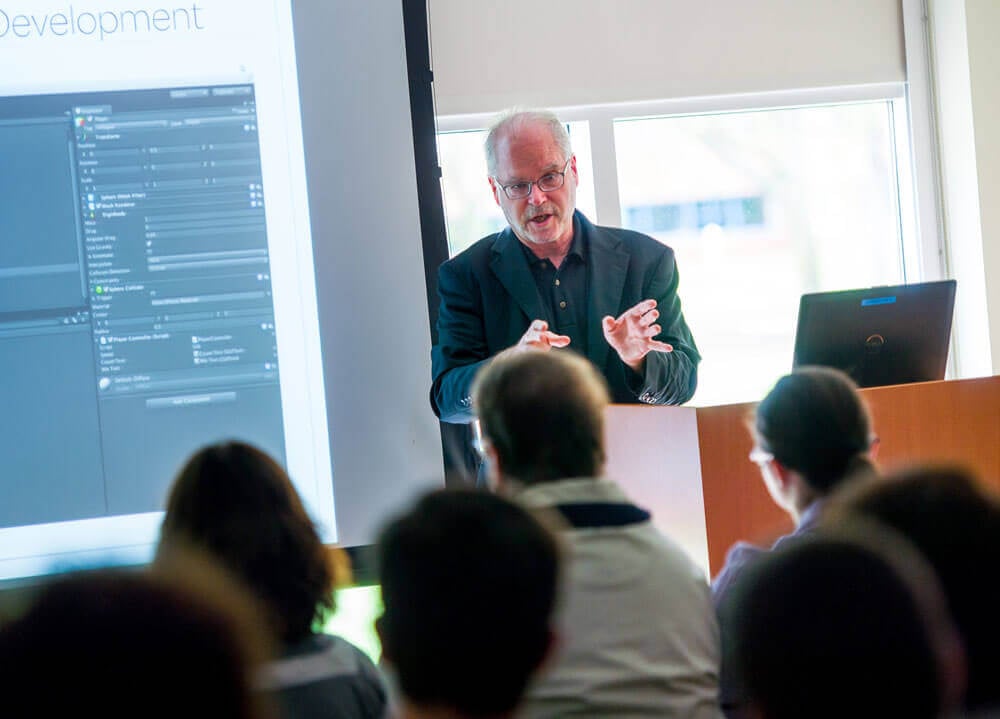
Quinnipiac professor, alumnus release video game to raise funds for charities supporting the fight against coronavirus
September 04, 2020

September 04, 2020

“COVID-19 Exterminator,” is a single player game available for Windows and Mac OS in which a player must navigate through a maze of bronchial tubes leading to chambers filled with alveoli—the small, balloon-like anatomical structures in the lungs that are essential for breathing—while engaged in a mission to eliminate the COVID-19 viruses.
“During the COVID-19 pandemic many of us have felt powerless and frustrated because of the threat of this unseen enemy,” Garvey said. “Given the popularity of the first-person shooter genre, I thought it might be fun to run around inside virtual lungs to seek and destroy the coronavirus and save a virtual patient. It turned out to be very satisfying and even cathartic to shoot and see the SARS-CoV-2 virus blown into bits of RNA.”
“COVID-19 Exterminator,” is free to play, but Garvey and Singer give players the option to donate funds through PayPal to organizations fighting on the front lines against the pandemic. Click here to download the game.
Garvey and Singer, a 2014 graduate, developed the game using Epic Games’ Unreal Engine software. Epic is the company behind the popular Fortnite game. Both men are members of the board of directors for GameDevCT, an organization dedicated to the development of the video games industry in Connecticut.
“Making this game or any game, represents a considerable investment of time and effort,” Garvey added. “Rather than an opportunity to make money we agreed from the beginning that a free-to-play game that inspires players to donate to charities was one way we could contribute to raising awareness and helping bring an end to the pandemic. Our ‘sweat equity’ has the added value of allowing us to leverage our knowledge of the Unreal Game Engine to make something that may, in some small way, help those on the front lines of the battle against the virus.”
Singer, a Valley Stream, New York resident who majored in computer science and took game design and development courses at Quinnipiac, has most recently worked as a programmer for Labrodex Studios, a game studio in Melville, New York.
“Gameplay programming is something I’m passionate about,” he said. “I absolutely love making games, so being able to leverage my game development skills to create fun and engaging experiences for a project that raises funds for charities fighting COVID-19 is an exciting opportunity.”
Garvey, who first joined Quinnipiac in 1999 with a two-year appointment as Visiting Fellow in the Arts, got started in the games industry at Parker Brothers (the makers of Monopoly) and Spinnaker Software, contributing to many published games. As a digital artist, he has exhibited interactive computer based installations in the United States, Canada, Europe and elsewhere at venues such as Pratt Manhattan Gallery in New York, the Victoria and Albert Museum in London, Ars Electronica in Linz, Austria and Tech Fest in Mumbai. His work has been written about in publications as varied as Wired Magazine and National Geographic Magazine. He presents at conferences around the world and frequently publishes articles, most recently in the Journal of Mathematics and the Arts.
His academic responsibilities are as diverse as his research. In 2001, he joined the Department of Computer Science and Interactive Digital Design (now Graphic Interactive Design in the School of Communications) and helped to develop and roll out the then new IDD curriculum. He pioneered the use of the university’s Motion Analysis Lab in the Center for Medicine, Nursing and Health Sciences to collect motion capture data used for 3D animations and games. In 2010, he founded and served as the first director of the Game Design and Development program, and developed and taught the first courses in the GDD curriculum. Garvey served as program director until 2019. He also served as the chair of the Department of Visual and Performing Arts and for many years chaired the Committee for Service and Service Learning (now the Committee for Civic and Community Engagement). During the 2019–2020 academic year, he held joint appointments as a Fellow of the CAS Center for Interdisciplinary and Integrative Studies (CIIS) and as a Fellow of Quinnipiac’s Center for Teaching and Learning (CTL). As a composer and pianist, he often performed in the College of Arts and Sciences annual Cabaret.
Outside of Quinnipiac, Garvey has served as a member of the Greater New Haven Chamber of Commerce Technology Council, the Connecticut Academy of the Arts and Sciences and has been invited for artist/researcher residencies at Yonsei University in South Korea; Tribuhuvan University in Katmandu, Nepal; the University of Sussex in Brighton, UK; the Banff Centre in Alberta, Canada and was an associate artist of the Yale Digital Media Center for the Arts (now the Center for Collaborative Arts and Media).
Prior to Quinnipiac, he was chair of the Department of Design Art at Concordia University in Montréal and a member of the board of directors of the Montréal Design Institute. He also taught at Endicott College and the New England School of Art and Design, which is now part of Suffolk University, in Massachusetts. Garvey earned a master’s of science in visual studies degree from the Massachusetts Institute of Technology and was a fellow at the Center for Advanced Visual Studies at MIT from 1983-85. He also has a master's and a bachelor's of fine arts from the University of Wisconsin-Madison.
Quinnipiac Today is your source for what's happening throughout #BobcatNation. Sign up for our weekly email newsletter to be among the first to know about news, events and members of our Bobcat family who are making a positive difference in our world.
Sign Up Now